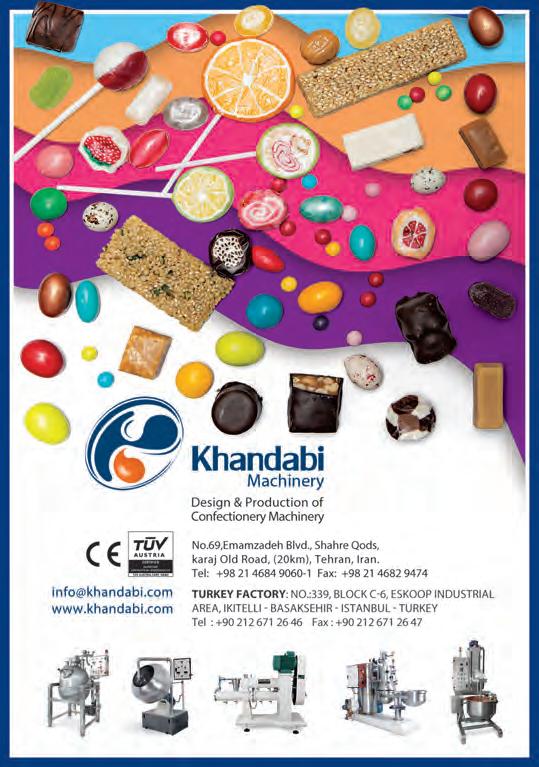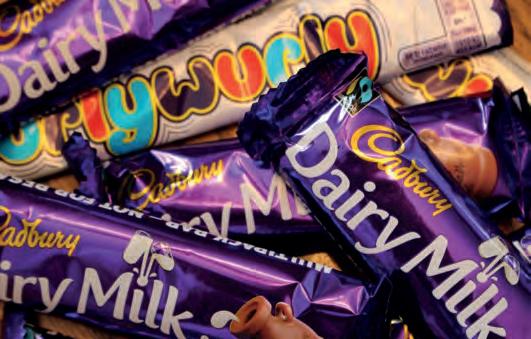
10 minute read
News Round-Up
Tate & Lyle announces major sustainability investment
Tate & Lyle PLC has announced a US$75 million investment in a new natural gas-fired combined heat and power system to deliver significant environmental and economic benefits at its Lafayette South corn wet milling facility in Lafayette, Indiana, US.
Advertisement
This investment, announced on World Environment Day, will support the delivery of Tate & Lyle’s ambitious new sustainability targets for 2030 published last month including to reduce greenhouse gas emissions, eliminate coal from its operations, and reduce water use.
The new gas turbines will generate electricity and steam to power and heat the facility, delivering a significant improvement in energy and operational efficiency. The new co-generation system will replace the site’s coal-fired boiler, delivering around 40% reduction in greenhouse gas emissions and around 5% reduction in water use.
Work at the site to transition from a coal-fired boiler to new Arla Foods Ingredients has welcomed the news that whey permeate can now be exported to China for use in food and beverage products. On 15 May 2020, China published an official safety and quality standard for using permeate powders in food processing – signifying that its market is ready to accept imports of the ingredient with immediate effect. The development comes as a result of a recent trade agreement between the US and China.
However, the standard applies globally, and permeate from any country may be exported to China provided it complies with the requirements. Henrik Jacob Hjortshoej, Head of Sales Development, Food at gas turbines is being undertaken with strict safety protocols that include social distancing and other protective measures.
This investment follows completion of a similar system at Tate & Lyle’s corn wet mill in Loudon, Tennessee in 2017. Tate & Lyle has a six-year, US$150 million productivity programme,
Arla Foods Ingredients, said:
“The opening of the Chinese market to permeate exports is highly significant for the global dairy ingredient industry.
Demand for permeate is rising fast in China, just as it is across the world. We look forward to working with our customers in which is now in its third year, and this investment is part of delivering that programme.
Travis Montoya, Plant Manager at Lafayette South, said: “This major investment will make our facility more efficient and directly benefit the local community through improved air quality, decreased water use, and less China to supply them with the highest quality whey permeate powder for their food and beverage applications.”
Whey permeate is a milk solid with around 80% lactose content. Used as a bulking agent, it is a highly cost-effective replacement for skimmed milk powder, lactose truck traffic. At Lafayette South, we have a strong track record of energy efficiency, having received the U.S. Environmental Protection Agency’s ENERGY STAR accreditation for five consecutive years; this is a real source of pride for the local team.” Melissa Law, President of Global Operations at Tate & Lyle, added: “A key pillar of our purpose of Improving Lives for Generations, is to care for our planet and to help protect its natural resources for the benefit of future generations. This project at Lafayette South is a great example of our purpose in action and will help us meet our ambitious new environmental commitments, driving important energy-saving and environmental
China gives the green light to whey permeate imports
benefits.” and sweet whey powder. In 2017, powdered permeate received a Codex Alimentarius international standard. Arla Foods Ingredients markets Variolac® whey permeate, which has sweet milky taste, low ash content, stable mineral profile and free-flowing powder properties over a 12-month shelf life.
Permeate is increasingly being used by multinational brands, particularly in categories such as chocolate and biscuits, but also in hot drinks, dairy and desserts. Innova figures show that the number of new products containing whey permeate has more than doubled in recent years, growing from 169 in 2015 to 387 in 2019.

The Barry Callebaut Group to acquire GKC Foods in Australia
Barry Callebaut signs an agreement to acquire GKC Foods (Australia) Pty Ltd, a producer of chocolate, coatings and fillings, serving many consumer brands in Australia and New Zealand.
This acquisition establishes
Barry Callebaut’s direct presence and manufacturing capacity in the growing Australian market. The acquisition of GKC Foods empowers the Group to expand its position in the industrial chocolate market and to leverage its value-adding Gourmet & Specialties business in Australia and New Zealand. Barry Callebaut will continue to work with local distributors across Australia and New Zealand who have been importing and distributing its industrial and Gourmet chocolate and cocoa products to the country since the 1970s. Australia and New Zealand have an average chocolate consumption of approximately 5kg per capita, the highest per-capita chocolate consumption in Asia Pacific, according to Euromonitor. In Australia, demand for chocolate has been on the rise – the chocolate confectionery market in Today’s consumers are becoming more health conscious and are looking for cakes that contain less sugar, but still have the same great taste. Alongside that, Public Health England’s sugar reduction targets mean that manufacturers are seeking ways to offer reduced sugar items which meet the required goals set out this year.
Using their in-house expertise, Kells have refined a number of technologies that allow them to make lower sugar cake blends, without compromise on taste and to help their customers meet the targets set out by PHE. Customers can come to them with their own recipes and by using Kells’ technologies, can offer bespoke blends that achieve the required sugar reduction. For those seeking quicker options, their Crème Cake mix the country grew well above the global market according to Nielsen. GKC Foods has been manufacturing “Made in Australia” chocolate and confectionery products since
the 1980s. Today, the company produces a wide range of products including organic and vegan chocolate for dedicated chocolate shops, gourmet delis, specialty food outlets, and key national retailers. The company operates a chocolate factory and a warehouse in Melbourne.
Barry Callebaut’s investment involves upgrading and can be used to make a cake containing 14.5% sugar, which is 36% less than their standard Crème Cake mix. Bakers just need to add egg, water and vegetable oil to make a cake that is not only delicious but also has an excellent structure. The blend has no artificial sweeteners or oligosaccharide complications and can be decorated in the same way as their standard mix. MD of Kells, Robert Mosse says “Across the industry, there is a growing trend to reduce sugar following PHE targets that were set in 2016. From this we are seeing numerous food manufacturers making changes to their food and drink products. This is why it’s so important for us to make blends that meet PHE standards, that still look and taste great.” expanding the factory’s existing infrastructure, installing a new state-of-the-art chocolate production line, and the deployment of an integrated management system to enhance

automated production.
“We strongly believe in the growth opportunities of the Australian and New Zealand chocolate confectionery markets. We already have the highest quality products today and we will further grow our competitive advantage through the acquisition of, and investment in, the best-inclass GKC Foods manufacturing facility in Australia,” said Ben De Schryver, President of Barry Callebaut in Asia Pacific.
The transaction is subject to regulatory approval and other closing conditions. Expected completion is before the end of this calendar year. The parties have agreed not to disclose any financial details of the
Kells’ reduced sugar blend helps bakers meet targets
transaction.

85th anniversary celebrations for Cadbury Foundation
Cadbury’s marked the 85th anniversary on 19th June of its charitable foundation that has contributed millions to a number of charitable causes during its eventful history.
Originally named ‘The Charitable Brothers Trust’ in 1935, The Cadbury Foundation was established by company founders George and Richard Cadbury and builds on both the brand’s rich heritage and the Cadbury brothers’ conviction that investing in local communities is good for business. As the business, which is now under the ownership of Mondelēz International, noted, the brother’s approach saw them focus on creating a prosperous, enterprising and inclusive community at the company’s home in Bournville, Birmingham. With green spaces and the health and wellbeing of their employees at the heart of their work, the area became known as the ‘factory in a garden’. Since inception, the Foundation has been making donations to charities across the UK and Ireland supporting organisations to thrive and further benefit the communities they serve, with many of the Cadbury family serving as trustees throughout its history The very first donation made by The Cadbury Foundation was for £40 and was granted to Stirchley Girls Club in 1935. The first substantial contribution was then made in 1936 to the Bournville Village Trust, which enabled it to purchase the Weatheroak estate for £36,773. The Foundation is still going strong 85 years later and over the last 15 years alone has donated more than £10 million to registered charities and community partners across the UK and Ireland.
Today, it has longstanding partnerships with a number of inspirational organisations, such as The British Paralympic Association, Down Syndrome Ireland and Grocery Aid. The Foundation also makes a number of grants to support emergency appeals including South Yorkshire’s Community Foundation in response to the flooding at the end of 2019 and more recently supported the National Emergency Trust Coronavirus appeal. Along with national charities, the Foundation also supports smaller local charities that are important to its employee’s through a variety of programmes, such as its Cash Match initiative, which recognises employee fundraising efforts by matching the total amount raised. The company’s ‘Your Charity Your Choice’ scheme also proves exceptionally popular each year and sees employees nominate wellbeing-related charities that they have a personal connection to, with the final shortlisted charities voted for by the wider work force. Kelly Farrell, community affairs manager at Mondelēz International, commented: “We’re extremely proud to continue the spirit of the Cadbury brothers and support so many fantastic charities and projects which make a real difference to the lives of so many each year.
“It’s still just as important to invest in local communities today as it was in 1935 and it’s a real privilege for us to continue the work of the Foundation 85 years later.”

Online confectionery sales expected to grow for rest of 2020
An upturn in online food sales, including confectionery and bakery resulting from the coronavirus pandemic has provided key insights into the future of the retailing within the sector, according to a leading food and drink IT specialist.
CSB-System says that the growth offers a huge opportunity for manufacturing and trade companies and that the current crisis has only accelerated a trend that experts have long seen coming. “A recent study from GlobalData has forecast that the UK online food & grocery retail market will grow by 25.5% this year,” said Timo Schaffrath, the company’s marketing & PR manager. “Nevertheless, even before coronavirus, the figure for 2020 was still an impressive 8.5%.
“Such statistics back up a precrisis study from Oliver Wyman consultants, who forecast a fivefold increase in online grocery sales in Germany.”
CSB says that proper planning will be essential to maximise opportunities and that rather than trying to make short-terms gains, companies should take the longer view.
“To be successful from the start,” Schaffrath added, “it is important to have the systems in place to ensure all relevant information is correctly displayed and regularly updated, and that customers receive a fast response and prompt deliveries.” Key to this is an adequate ERP system to act as the technical basis for the digital shopping baskets. ERP is essential because it lays the foundation for easy implementation of automatic, up-to-date agreements on prices and discounts, and product specifications such as weight and use-by dates. Alongside this, companies need to establish a coherent and easy to navigate representation of their existing product catalogue. To achieve this effectively, CSB recommends replacing a website’s home page with the online shop. A high-quality display of products will be the most important consideration for customers and making this the first page that they see reduces the number of clicks necessary to find what they are looking for.








